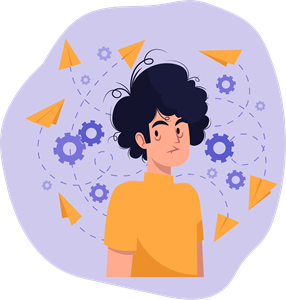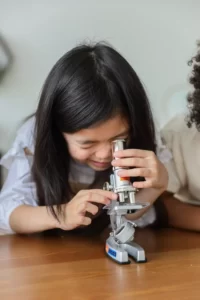How ADHD affects the Brain The real effects of ADHD...
Read MoreAddiction
All you need to know about Addiction
Find out our expert answers to the top questions asked on Google regarding Addiction
Snealth will answer all of it as openly and clearly as possible
Addiction occurs in a spectrum. You may be having mildly addictive tendencies or a severe predisposition towards addiction. Medically, it is generally viewed as a treatable medical condition rather than a disability.
Genetic factors may influence a person’s tendency toward addiction. This can be related to how the brain processes certain substances or behaviors.
For example, certain genes related to dopamine receptors and neuro-transmitters can influence a person’s response to certain things & their likelihood to develop dependence. It is very important to note that genetic predisposition is not deterministic, thus many people with genetic risk factors may not develop addiction & many without a predisposition do.
Addiction is generally considered to be a harmful condition. It involves compulsive behaviors that often lead to adverse consequences.
However, some people use the word in a different context, when they mean a strong passion toward something. In the sense they are addicted to something they love, like “music” or “cricket.” Its not the same as clinical addiction, which has harmful effects.
- Change in Reward Paths : Addiction often involves substances or behaviors that change the brain’s reward system. Repeated exposure to the stimuli that causes these behaviors can change our brain’s wiring, resulting to a diminished response to a natural stimuli and an elevated response to an addictive stimuli
- Structural Changes : Areas in the brain responsible for decision making, control and judgement can change because of addiction
- Neuro-transmitter Change : The balance of neuro-transmitters in the brain can be disrupted because of addiction, causing mood swings, anxiety & depression.
- Coping Mechanisms : Instead of effectively dealing with a mental health issue, a person with addiction can fall into a dependency spiral by turning to addictive substances or behaviors.
Around 1930s, a person suffering from any kind of addiction was viewed as morally flawed or lacking will-power. But now we are at a stage where we know why it
A proper clinical diagnosis is usually through a comprehensive assessment by a mental healthcare professional. The diagnostic processes usually involve these steps :
- Clinical Interview
- Screening Tools
- Diagnostic Criteria
- Consequence Study
- Physical Examination
- Psychological Assessment
- Toxicology Tests
- Family History
- Social Behaviors
- Collateral Information
If you wish to gain any further information, please contact us.
If you think you may be having an addiction, please do not hesitate to contact us. We would be happy to assist you to conquer it.
They are all related concepts, but they aren’t the same.
- Addiction : Characterized by the compulsive use of a substance or behavior despite its negative consequences
- Dependence : Characterized by a body’s adaptation to the presence of a substance or behavior
- Habit : Characterized by repetitive action performed automatically. They can be positive or negative
- Obsession : Characterized by preoccupation or constant thinking about a particular thought, idea or behavior
Addiction usually begins with an introduction to the behavior or substance. The substance or behaviour once tried provides a pleasurable experience to our brain’s reward systems.
This positive reinforcement encourages the individual to repeat the behavior or substance use. Over time, the body & brain may get used to the same substance or behavior, meaning the same amount of substance or behavior does not produce the same amount of pleasure.
Dependence : As tolerance develops, the person may increase the quantity of their behavior or substance use in order to maintain the desired effect.
Addiction usually occurs because of a combination of factors, which are psychological, physiological, and environmental. It is challenging to conquer because of the following:
- Changes in the brain’s wiring : Neural pathways change, and the ability to experience pleasure from non-addictive sources decreases
- Withdrawal & Cravings : When kept away from the addictive behavior or substance, the person may experience withdrawal symptoms, like irritation, anger, depression, etc. Cravings for the addictive substance or behavior are intense at time, and can be triggered by anything in the environment.
- Stigma & Shame : A person may feel ashamed or judged, which can deter them from reaching out for professional treatment.
- Relapse : This can be a seemingly endless spiral, as well-meaning individuals struggle to conquer over their addiction.
All these factors make conquering an addiction easier said than done.
Supporting someone who has an addiction is challenging. It is important to approach the situation with empathy, skill & care. Here are some tricks :
- Avoid Shaming : Don’t blame or shame the person for their addiction. Addiction is a medical condition, and by being judgemental, we are hindering their ability to get help
- Empathize : Try to understand their feelings & struggles and empathize with them
- Educate yourself : Start by learning about their specific addiction. Join our Community and ask us questions if you need help with our resources
- Avoid Enabling : Don’t enable their addiction. It may seem difficult to watch your loved ones struggle with their addiction as they go through withdrawal symptoms.
Free Mental Health Tests & Quizzes
Anxiety Test
Social Anxiety Test
ADHD Test
Addiction Test
Bipolar Test
Borderline Test
PTSD Test
Insomnia Test
Job Stress Test
Exam Stress Test
Loneliness Test
Marital Issues Test
Panic Disorder Test
OCD Test
Schizophrenia Test
Autism Test
Quick Notes on Addiction
Symptoms
We have identified these 10 symptoms. Please note that it may not be a complete list.
- Craving
- Loss of Control
- Increased tolerance to substance
- Withdrawal symptoms when not used
- Neglect of Responsibility
- Loss of Interest
- Risky Behaviors
- Social / Relationship issues
- Failed attempts to Quit
- Time Consumed
Types of Addiction
Addiction can manifest in different forms, they are usually categorized as Substance Addictions & Behavior Addictions :
Substance Addiction
- Alcohol Addiction
- Drug Addiction
- Tobacco Addiction
- Painkiller Addiction
- Caffeine Addiction
Behavioral Addiction
- Gambling Addiction
- Shopping Addiction
- Shoplifting Addiction
- Gaming Addiction
- Internet Addiction
- Social Media Addiction
- Porn Addiction
- Sexual Addiction
- Relationship Addiction
- Food Addiction
Across the Ages
How prevalent is Addiction across age groups

No Data Found
Find Addiction Treatment near me
Find Addiction Therapist near me
We are connected to a network of 120+ trusted Mental Healthcare Professionals and many of them have successfully helped in conquering people’s addiction problem.
Find Addiction Centre near me
Our Addiction Centres are present in Mumbai, Thane, Navi Mumbai, Pune, Delhi, Bengaluru, & Hyderabad. Contact us to know more details
Join our Snealth Community
We are developing a community on WhatsApp where people can openly and safely share about their addiction and get support & accountability from people around the world
Parenting ADHD
Parenting & ADHD
Read MoreADHD and Relationships
ADHD and Relationships Mental Health Issues | ADHD | by...
Read MoreRead or Hear Stories about people who went through Addiction
About Us
Mental Healthcare is our top priority. The pandemic has affected the mental health of a lot of us, and snealth aims to revive each of us with the help of its technologies. We are groups of helping individuals who want to get you to boost your mental health. We help you get comfortable with yourself, so that you can lead a content life.
Snealth provides you with care, helps you get to a state of mind where you can appreciate life and living. We aim at removing the stigma around mental health and make society more inclusive, accepting and judgement free.






